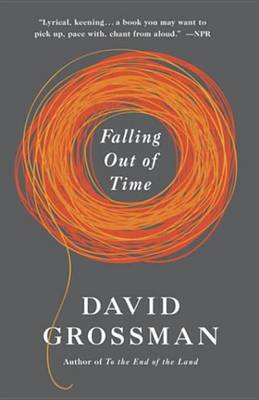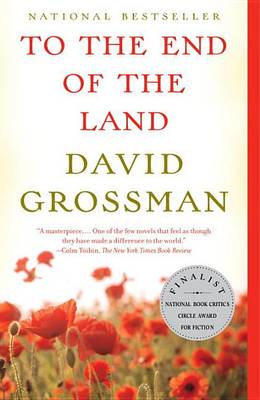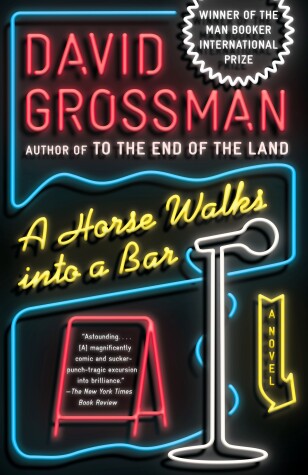Vintage International
3 total works
In Falling Out of Time, David Grossman has created a genre-defying drama--part play, part prose, pure poetry--to tell the story of bereaved parents setting out to reach their lost children. It begins in a small village, in a kitchen, where a man announces to his wife that he is leaving, embarking on a journey in search of their dead son.The man-called simply the "Walking Man" --paces in ever-widening circles around the town. One after another, all manner of townsfolk fall into step with him (the Net Mender, the Midwife, the Elderly Maths Teacher, even the Duke), each enduring his or her own loss. The walkers raise questions of grief and bereavement: Can death be overcome by an intensity of speech or memory? Is it possible, even for a fleeting moment, to call to the dead and free them from their death? Grossman's answer to such questions is a hymn to these characters, who ultimately find solace and hope in their communal act of breaching death's hermetic separateness. For the reader, the solace is in their clamorous vitality, and in the gift of Grossman's storytelling - a realm where loss is not merely an absence, but a life force of its own.
Ora, a middle-aged Israeli mother, is on the verge of celebrating her son Ofer's release from army service when he returns to the front for a major offensive. In a fit of preemptive grief and magical thinking, she sets out for a hike in the Galilee, leaving no forwarding information for the 'notifiers' who might darken her door with the worst possible news. Recently estranged from her husband, Ilan, she drags along an unlikely companion: their former best friend and her former lover Avram, once a brilliant artistic spirit. Avram served in the army alongside Ilan when they were young, but their lives were forever changed one weekend when the two jokingly had Ora draw lots to see which of them would get the few days' leave being offered by their commander - a chance act that sent Avram into Egpyt and the Yom Kippur War, where he was brutally tortured as a POW. In the aftermath, a virtual hermit, he refused to keep in touch with the family and has never met the boy.
Now, as Ora and Avram sleep out in the hills, ford rivers and cross valleys, avoiding all news from the front, she gives him the gift of Ofer, word by word; she supplies the whole story of her motherhood, a retelling that keeps Ofer very much alive for Ora and for the reader, and opens Avram to human bonds undreamed of in his broken world. Their walk has a 'war and peace' rhythm, as their conversation places the most hideous trials of war next to the daily joys and anguish of raising children. Never have we seen so clearly the reality and surreality of daily life in Israel, the currents of ambivalence about war within one household, and the burdens that fall on each generation anew. Grossman's rich imagining of a family in love and crisis makes for one of the great antiwar novels of our time.
Now, as Ora and Avram sleep out in the hills, ford rivers and cross valleys, avoiding all news from the front, she gives him the gift of Ofer, word by word; she supplies the whole story of her motherhood, a retelling that keeps Ofer very much alive for Ora and for the reader, and opens Avram to human bonds undreamed of in his broken world. Their walk has a 'war and peace' rhythm, as their conversation places the most hideous trials of war next to the daily joys and anguish of raising children. Never have we seen so clearly the reality and surreality of daily life in Israel, the currents of ambivalence about war within one household, and the burdens that fall on each generation anew. Grossman's rich imagining of a family in love and crisis makes for one of the great antiwar novels of our time.
**WINNER OF THE 2017 MAN BOOKER INTERNATIONAL PRIZE**
The award-winning and internationally acclaimed author of the To the End of the Land now gives us a searing short novel about the life of a stand-up comic, as revealed in the course of one evening’s performance. In the dance between comic and audience, with barbs flying back and forth, a deeper story begins to take shape—one that will alter the lives of many of those in attendance.
In a little dive in a small Israeli city, Dov Greenstein, a comedian a bit past his prime, is doing a night of stand-up. In the audience is a district court justice, Avishai Lazar, whom Dov knew as a boy, along with a few others who remember Dov as an awkward, scrawny kid who walked on his hands to confound the neighborhood bullies. Gradually, as it teeters between hilarity and hysteria, Dov’s patter becomes a kind of memoir, taking us back into the terrors of his childhood: we meet his beautiful flower of a mother, a Holocaust survivor in need of constant monitoring, and his punishing father, a striver who had little understanding of his creative son. Finally, recalling his week at a military camp for youth—where Lazar witnessed what would become the central event of Dov’s childhood—Dov describes the indescribable while Lazar wrestles with his own part in the comedian’s story of loss and survival. Continuing his investigations into how people confront life’s capricious battering, and how art may blossom from it, Grossman delivers a stunning performance in this memorable one-night engagement (jokes in questionable taste included).
The award-winning and internationally acclaimed author of the To the End of the Land now gives us a searing short novel about the life of a stand-up comic, as revealed in the course of one evening’s performance. In the dance between comic and audience, with barbs flying back and forth, a deeper story begins to take shape—one that will alter the lives of many of those in attendance.
In a little dive in a small Israeli city, Dov Greenstein, a comedian a bit past his prime, is doing a night of stand-up. In the audience is a district court justice, Avishai Lazar, whom Dov knew as a boy, along with a few others who remember Dov as an awkward, scrawny kid who walked on his hands to confound the neighborhood bullies. Gradually, as it teeters between hilarity and hysteria, Dov’s patter becomes a kind of memoir, taking us back into the terrors of his childhood: we meet his beautiful flower of a mother, a Holocaust survivor in need of constant monitoring, and his punishing father, a striver who had little understanding of his creative son. Finally, recalling his week at a military camp for youth—where Lazar witnessed what would become the central event of Dov’s childhood—Dov describes the indescribable while Lazar wrestles with his own part in the comedian’s story of loss and survival. Continuing his investigations into how people confront life’s capricious battering, and how art may blossom from it, Grossman delivers a stunning performance in this memorable one-night engagement (jokes in questionable taste included).


